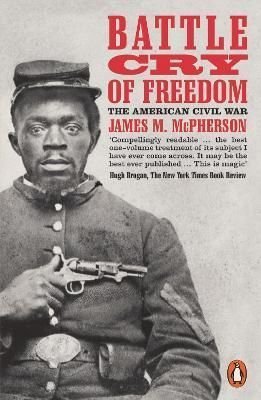
He was appointed in 1991 by the United States Senate to the Civil War Sites Advisory Commission, which determined the major battle sites, evaluated their conditions, and then recommended strategies for their preservation. Knowing the value of place and memory in the process of history has made McPherson a crusader for preservation. While visiting the battlefields and re-examining the gruesome events there, his students often ask, "Why were men willing to cross this territory when they knew that may of them would not come back?" He lives in New Jersey with his wife of forty-three years, Patricia. McPherson has taught at Princeton since 1962 and is the George Henry Davis '86 Professor of American History. One catalyst for his interest in the private lives of the Civil War volunteer soldiers came out of the yearly tours to battlefields that he makes with his students at Princeton University.

"The Northern definition of liberty was the preservation of the Union.the South professed to be fighting for self-government." "A great tragedy, in many ways, is that both sides look back to the same revolution of 1776 as the inspiration for the liberty that they were fighting for from 1861 to 1865," says McPherson.

What he found were a group of men who were deeply religious, fatalistic, and true believers in ideas of freedom. To begin, McPherson went to the letters and diaries of the soldiers themselves and combed through twenty-five thousand of them. How does a historian discover and analyze the thoughts and feelings of three million people?" asks McPherson. "Three million soldiers fought in the Union and Confederate armies. His latest work, which won the Lincoln Prize for 1998, For Cause and Comrades: Why Men Fought in the Civil War, delves into the hearts and minds of the soldiers on both sides. He has since written several books about abolition, the war, Abraham Lincoln, and Reconstruction. His dissertation about the abolition movement went on to be published in 1964 as The Struggle for Equality: Abolitionists and the Negro in the Civil War and Reconstruction. My first entrée in Civil War scholarship focused on that very theme," says McPherson. "I was struck by all of these parallels between what was a freedom crusade of the 1860s and a freedom crusade of the 1960s. While McPherson was in Baltimore, events similar to the abolition movement he was studying were taking place all around the country. His subject for study were the abolitionists whose passions and protests helped put Abraham Lincoln in office and shape the social reforms brought about by the war. But it was not the war McPherson focused on then. Vann Woodward at Johns Hopkins University. The continuing relevance of those issues, I think, is one reason for the continuing fascination with the Civil War."īorn in North Dakota and raised in Minnesota, McPherson's first fascination with the Civil War began as a graduate student in 1958 under the mentorship of C. "These issues are still important in American society today: regionalism, resentment of centralized government, debates about how powerful the national government ought to be and what role it ought to play in people's lives. "Even though the war resolved the issues of Union and slavery, it didn't entirely resolve the issues that underlay those two questions," McPherson says.


New histories, biographies, miniseries, novels, and reenactments continue to capture the American imagination about the turbulent years between 18, partly because, as McPherson explains, the issues that caused the war are still with us. Because of it and other books, followed closely by Ken Burns's documentary, now thousands of Americans every year choose to visit historic battlefields and homes of Civil War generals and leaders. Battle Cry went on to win the Pulitzer Prize and has since sold more than six hundred thousand copies.īattle Cry of Freedom helped launch an unprecedented national renaissance of interest in the Civil War. Although historians had been McPherson at Gettysburg writing about the Civil War for decades, McPherson's book broke ground in combining the complexities of the war while maintaining the narrative that made it appealing to the American public. In 1988, his book Battle Cry of Freedom: The Civil War Era moved beyond the pillars of academia and into the public realm. "No period of American history makes greater demands on the historian than that of the Civil War," C.


 0 kommentar(er)
0 kommentar(er)
